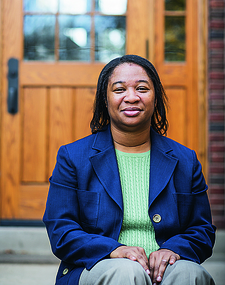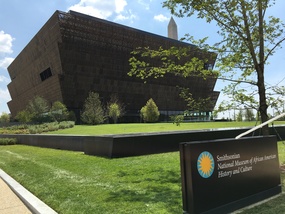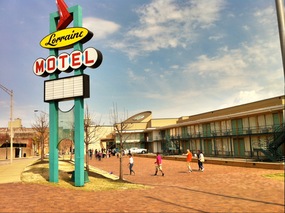Quite a few people on campus are envious of where DJ Brooks ‘20 is heading for spring break.
Cancun? Daytona Beach? South Padre Island?
Nope. There are three stops in Alabama, though.
Brooks is joining 18 other Carleton students on what promises to be one of the more uniquely designed and history-packed excursions offered by the college over spring break. Northfield to Selma, a 10-day trip led by Carolyn Livingston, vice president for student life and dean of students, will explore important places and events in civil rights history. Among the key locations: The National Underground Railroad Freedom Center (Cincinnati), Smithsonian National Museum of African American History and Culture (Washington, D.C.), Martin Luther King Jr. National Historic Park (Atlanta), Edmund Pettus Bridge (Selma, AL), The 16th Street Baptist Church (Birmingham, AL) and the National Civil Rights Museum/Lorraine Motel (Memphis).
“I’m just excited about how much I'll learn. This is civil rights and history that I haven’t had the chance to see up close before,” says Brooks, a Chicago native. “I’ve already heard from a lot of staff members who’ve said, ‘We didn’t get to do something like this when we were in college!’ They’re pretty jealous.”
Count President Steve Poskanzer among the admirers—“He has told me several times that he really wants to go,” Livingston says. Several Carleton alumni have inquired, as well. Livingston’s focus: “Let’s get this first one done, and if it works, then we can explore some more options for the future,” she says, laughing.
Planning for the extensive trip began in September, and thanks to her staff, blossomed in ways that even surprised Livingston. The significant stops on the itinerary were obvious: D.C., Atlanta, Memphis, and the Alabama trifecta of Montgomery-Selma-Birmingham. Yet beyond the sheer logistics of traveling by charter bus to multiple locations in multiple states on multiple days, Livingston’s staff also wanted to make sure downtime felt intentional, not hurried.
In several cities, dinner options will come with a side of history. For instance, the group will eat at Paschal’s in Atlanta—a landmark meeting place for Civil Rights Movement leaders and a Martin Luther King Jr. favorite—and Lannie’s Bar-B-Q in Selma, an African American owned barbecue joint that fed Freedom Riders.
“How do we marry the theoretical and the practical? How do we provide experiences for students that are transformational?” Livingston says of Northfield to Selma's genesis. “Our students have read a lot about history. They’ve seen it in movies. But a lot of them haven’t actually been to these places to experience it.
“Some of them have also been told to stay away from the South. To not even visit. Or some are from the South and have never gone to these places. Some are international students and will see this trip through a completely different lens. We’re quite excited about the exposure they’ll all get to so many important lived experiences.”
Northfield to Selma takes off Thursday for Cincinnati, home of the National Underground Railroad Freedom Center. While Deep South cities later in the trek offer opportunities to explore African American history through notables like MLK, Rosa Parks, and the Selma marchers, Washington D.C. encapsulates the trip’s mission to include civil rights struggles from various groups throughout history, Livingston says.
On Saturday, students will visit Frederick Douglass’ Cedar Hill house (where he died), the Smithsonian National Museum of the American Indian, and (optionally) the United States Holocaust Memorial Museum. Sunday brings a guided walking tour of the National Mall with the National Park Service, and perhaps most impressively, an early look at the Smithsonian National Museum of African American History and Culture.
Both Livingston and Brooks are especially excited for the newest Smithsonian jewel, which opened in September and has been sold out every day since.
“One, we got tickets,” Livingston says, beaming. “Two, I just think it’s going to be fabulous, to be able to see all that history in one building.”
Before earning selection for the trip, students submitted an essay on why they were interested in civil rights history and what personal experiences they would bring to the group. The Dean of Students office also subsidized the $700 cost for Carls who couldn’t afford it, Livingston says.
While traveling, students will blog and reflect on each day’s sights and sounds. And, of course, so much time spent traveling on a bus together will offer informal opportunities for dialogue—which Brooks says will be one of the highlights for him.
“I’m really looking forward to bonding with the other students that are going,” says Brooks, who would have otherwise spent his spring break at Carleton. “Some of them I already call my friends. But I know that this is a unique opportunity, as a freshman, to learn from older students I don’t know and have some great conversations about what we’re seeing.”
“I already told them, ‘I don’t want you to learn everything on this trip. I want you to learn enough to where you want to learn more,’” adds Livingston, who as a staff member, also felt it was important for her to bond with students away from campus. “The learning capacity on this trip is huge. For all of us. I think it’s going to be a great way to engage thoughtfully with our students in new and different spaces. It’s really going to be fun.”



